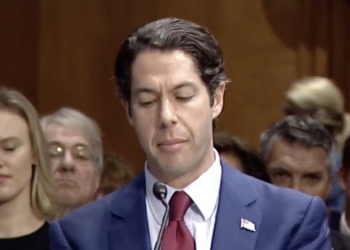There is often little to celebrate in Opposition. Politics is a game of possession.
If you are not holding power, there is not much you can do to shape anything. With that in mind, you can see why the party is tempted to gloat about the Winter Fuel Payment U-turn. Popular opinion, backed by some campaigning from our side, has forced the government to reverse course. Starmer and Reeves appear weak; the Opposition looks like they are scoring points. It’s a rare highlight in what has been a challenging twelve months for the party.
Yet, really, this joy is misplaced.
The reversal on the allowance shows not just a problem that Labour faces but that the Conservatives will repeatedly encounter should we ever get back to power. The country is hooked on fiscal ill-discipline and is not prepared to countenance the sort of things we really need to do to get the tax burden down. While we may be glad that Labour is getting kicked for this now, we may rue our approach when it’s our turn to instil some fiscal continence.
Our defence of the WFP always felt more opportunist than principled. After all, we ourselves talked of abolishing it in 2017. It is a poor and unnecessary policy from a Conservative perspective. As a benefit, it represents one of the worst kinds of spending – giving too little money to those who need it and too much to millions who don’t. The universality of benefits is a Scandi-style, social democratic approach. It is not a Conservative one. The only thing that mitigates against scrapping it, as Labour has found, is its popularity.
The support for WFP relies on misguided assumptions about older people. Those who are struggling are a very real group, but they are a minority. In addition to the state pension, many have considerable private incomes. They also have lower costs than equivalent working people – being exempt from National Insurance and far more likely to own their homes outright. Now, on Labour’s revised policy, couples with a combined income of up to £70,000 will receive the benefit. A similar bung to working-age people would be seen as an outrage.
Yet, all these arguments have failed. The public, it is clear, wants to continue passing millions of pounds of taxpayers’ money to the comfortably off. Even revenue-neutral changes, like shifting the money towards pension credit or raising the threshold for that targeted benefit, have failed to achieve popularity. Removing the fuel payment is just a political nightmare. That’s not a good signal for the right.
The awkward truth is that while we talk about reducing spending and lowering taxes, the public is reluctant to give up many of the things the money goes on. We’ve seen this repeated time and time again. Austerity was popular among Conservative voters until it started touching some of the services they cared about. The high spending response to Covid pushed Rishi Sunak to unprecedented highs of popularity both with our members and the public at the time. When Liz Truss bailed out everyone’s energy bills, it was perhaps the part of the mini-budget that had public support – and most of the criticism was that it didn’t go far enough.
This is a real problem for political parties that want to talk about lowering taxes. Unless we delve into the sort of fantasy economics that Farage is now promising, balancing the books means addressing both sides of the ledger. Much of this will require cutting things, like Winter Fuel – that are popular. Indeed, many of them will have better arguments to keep them than these payments.
WFP were a relatively small amount of money for both the government and the individuals concerned. Abolishing it would, at best, have saved around a billion pounds, which is almost nothing in terms of government spending. For recipients, it was about an extra week’s worth of pension payments. Yet it ballooned into a lingering, six-month row that has now seen the government back down. If the Treasury can’t achieve this, you have to wonder if anything will stem the tide of ever-increasing public expenditure.
It also shows the difficulties of even wider systemic reform. Our demographic pressures mean there are real challenges around the future of the state pension and of the long-neglected social care settlement. Addressing these would mean wide-ranging changes. Looking at how NI is levied and differentiated from Income Tax, the sustainability of the Triple-Lock, personal contributions around care, and, of course, the retirement age. All of this looks almost impossible when you consider how even a modest change to retirement benefits has played out.
The winter fuel row has shown the real obstacle to big government policy: you cannot afford to create losers, especially sympathetic ones. Withdrawing winter fuel did leave people worse off, and even if most of them could shoulder it, they had public support. As a voting bloc, the old are important – but they are also generally backed up by the young. Making them lose out invites a backlash across the political spectrum. That sort of backlash kills policies.
If we are ever going to have the chance to reduce taxes or achieve broader reform of how we raise and spend money, there will inevitably be losers. They will be noisy and launch campaigns. Many of them will be sympathetic. If a government is unable to face them down, it will find it hard to make the changes it needs. These fights are likely to be many times harder than those over winter heating.
It is easy to smile at Labour coming unstuck over these cuts. The fact it has happened, however, paints an uncomfortable picture for a future Conservative administration. To get state spending down, to get taxes lower, will (absent some miracle of growth) mean wading into bits of spending that are popular and create sympathetic losers when you take them away.
While it is gratifying to see your opponent caught in this sort of trap, it really only highlights the challenges that lie ahead for any government. Britain is stuck with low growth and high spending demands. Raising taxes to meet them might be politically difficult, but so too is slimming the state further. Quite simply, there is a lot of public spending that people will rally around if it is threatened. If a government can’t take a few hundred pounds a year from people who mostly don’t need it, it does not bode well for bigger, more controversial changes.



![Former Bravo Star Charged After Violent Assault Using a Rock-Filled Sock in Tennessee Walmart [WATCH]](https://www.right2024.com/wp-content/uploads/2025/07/Former-Bravo-Star-Charged-After-Violent-Assault-Using-a-Rock-Filled-350x250.jpg)



![Karoline Leavitt Levels CNN's Kaitlan Collins and Other Legacy Media Reporters [WATCH]](https://www.right2024.com/wp-content/uploads/2025/07/Karoline-Leavitt-Levels-CNNs-Kaitlan-Collins-and-Other-Legacy-Media-350x250.jpg)
![Man Arrested After Screaming at Senators During Big Beautiful Bill Debate [WATCH]](https://www.right2024.com/wp-content/uploads/2025/06/Man-Arrested-After-Screaming-at-Senators-During-Big-Beautiful-Bill-350x250.jpg)








